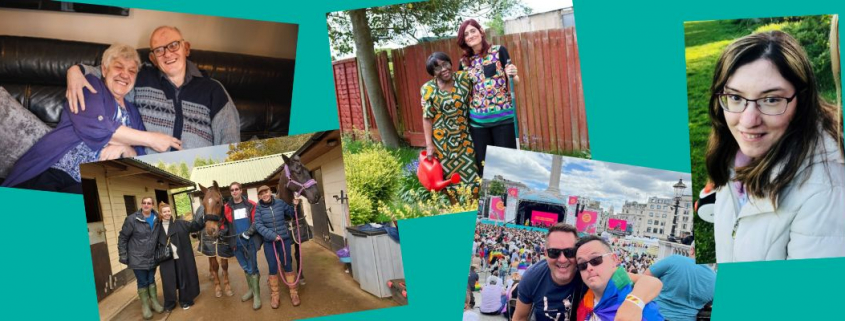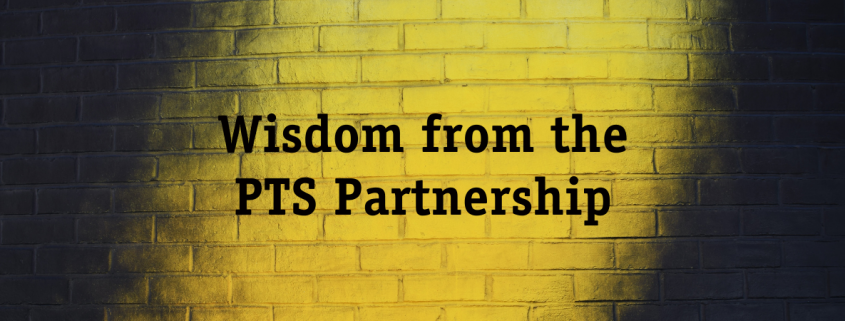If we focus on a positive future for social care, change can happen – Innovation in action partnership at #NCASC 2022
“Keep your face always toward the sunshine and shadows will fall behind you.” – Walt Whitman
Social care is under a cloud right now, for many good and well-rehearsed reasons, but if we give up on the hope that things can get better, things will get only worse.
Luckily, you don’t have to search very hard to find cause for optimism. There are some great things going on across the length and breadth of the UK that are making a difference to people’s lives every day. We’ve seen that when individuals and communities are involved together with decision-makers, it creates new opportunities. For example:
In Bury, Verity who is supported by Shared Lives told us
“What I like about Shared Lives is the people who I work with are very kind and caring. It gets you out and about and making new friends.”
In York, you will hear something similar from people who draw on the support of a Local Area Coordinator to build their own vision for a good life. Like Dee, who told us:
“There is a great power and confidence in knowing that support is available to you but also knowing that you are in charge of how you receive that support.”
And in Kirklees, you will learn how people are changing services for the better through their Coproduction Board which was set up with the support of the Social Care Institute for Excellence (SCIE).
These examples are glimmers of what is possible but these really person-centred and strengths-based solutions are not available everywhere, to everyone. This needs to change!
We have formed a partnership at this year’s National Children and Adult Social Care Conference (NCASC) to show that there is a different way; a road towards a different approach to social care and support which is characterised by decency, hope, love and relationships, rather than fear, fragmented lives, frustration and despair.
The Social Care Future vision developed by people who draw on support underlines the importance of this approach: “We all want to live in the place we call home with the people and things that we love, in communities where we look out for one another, doing the things that matter to us.”
How do we get there?
If we work together – galvanising the voice of local people in decisions about support – encourage and champion innovation and shift more power to individuals and communities which draw on support, then a brighter future is possible.
Key actions are:
- Developing a clear, shared story about how we work and what we want to change. This needs to be developed jointly with people who draw on support in every local area. We need to build confidence and skills in doing this so that all voices are heard and people are able to contribute to what is developed and delivered locally. We call this coproduction – the involvement of people in the design, development, delivery and evaluation of support – which needs to inform everything we do. We encourage local authorities to adopt and be guided by Making it Real, a framework which guides personalised support, which was coproduced with people who draw on support, and which underpins the CQC Assessment Framework.
- Connect up and invest in community assets, local community-led organisations, voluntary organisations and work with innovative support organisations to ensure that asset-based approaches are implemented in ways that reflect local conditions and have a lasting impact. Think Act Local Personal’s Directory of Community-Centred Support, also known as the ‘Rainbow’ provides examples of innovative organisations that can help.
- Building equalities into everything we do. The pandemic and the resulting recovery have exacerbated and widened what were already stark inequalities between different communities. As Clenton Farquharson, Chair of Think Local Act Personal recently wrote, “If inequality is designed, it can be redesigned. How? By involving the most marginalised people in the decisions which affect their life.” All of our plans need to be underpinned by a commitment to equality and inclusion.
- Commission differently. In determining what is developed locally, we need to focus on outcomes rather than on ‘purchasing’ a narrow set of activities or outputs. This will enable us to co-commission a wide range of local enterprises and back entrepreneurs and innovators, such as micro-enterprises, Shared Lives, Homeshare and Local Area Coordination.
Make systems and services simple and human, so that people stay in control and make choices. We know that social care is hindered by excessive and often obstructive processes and outmoded systems. We need to make systems and services simple and human, so that people stay in control and can make choices. This is one of the aims of the IMPACT centre’s Demonstrator site in Northern Ireland which is testing out how new forms of asset-based support for older people work in practice to understand how these can be implemented and scaled up effectively across a whole health and social care system.
- Share power, resources and risks fairly and openly, learning when we get things wrong. Mayday Trust deploys a Person-led, Transitional and Strengths-based response (PTS) to develop ways of working which create an environment where people have choice and control over their lives.
- Use really good and shared measures of wellbeing, resilience and equality. This does not mean we give up on some of the traditional measures completely but it does mean we value and invest in different things, such as people feeling more connected and in control. In the London Borough of Camden, for instance, service impact is increasingly understood in terms of how much people are enabled to draw on their own strengths rather than what services they receive.
Reaching the vision of a better care and support will not be straightforward of course. We know it will take time, commitment to coproduction and realignment of resources to enable the innovation and culture shift needed. This isn’t easy, but the current financial pressures we all face, far from distracting us, need us more than ever to focus on what is important to everyone who wants to live in thriving, connected communities. If we work together – galvanise the voice of local people and champion innovation then a brighter future is possible.
Want to find out more? Visit us in Manchester this week at NCASC 2022, stand E11
- Pip Cannons, Chief Executive, Community Catalysts
- Clenton Farquharson, Chair, Think Local Act Personal
- Alex Fox, Chief Executive, Mayday Trust
- Professor Jon Glasby, Director, IMPACT
- Ewan King, Chief Executive, Shared Lives Plus
- Ian McCreath, Director, Think Local Act Personal
- Kathryn Smith, Chief Executive, Social Care Institute for Excellence













